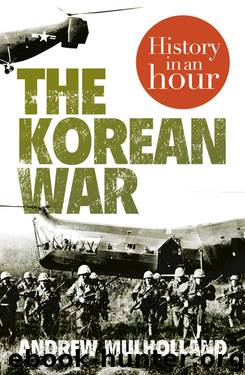The Korean War: History in an Hour by Andrew Mulholland

Author:Andrew Mulholland [Mulholland, Andrew]
Language: eng
Format: epub
ISBN: 9780007542574
Publisher: HarperCollins
Published: 2013-10-09T14:00:00+00:00
Entrenched: Peace Talks and Military Stalemate
Initial Peace Talks, July–August 1951
The first round of peace talks during the Korean War was to prove a frustrating failure. Their breakdown at the end of August was to lead to more fierce fighting before the two sides agreed to sit down again in October.
The interplay of military and political perceptions had entered a new phase by the summer of 1951, as China was forced to reappraise her position. Whereas only six months earlier the performance of Chinese formations in North Korea had persuaded Truman that the war could not be won by the United Nations in conventional terms, the same kind of calculation was now forced upon Mao and the Chinese leadership.
China had made a substantial commitment to the war in Korea. If in October 1950 her objective had been to push UN forces away from her border, by December she had been so successful that she was thinking in terms of conquering the South. Now, though, the limitations of the Chinese war machine had been exposed – by a UN army which had learnt through bitter experience and Ridgway’s inspired leadership. Horrendous losses and the logistical difficulty of maintaining offensive momentum meant that China no longer had the means to drive the United Nations south. They had tried, and both sides had been forced to amend their war aims because of their experiences thus far. Both were now being pushed towards the same resolution – a negotiated settlement along the lines of the pre-war situation. Strategic deadlock had precluded a more decisive result. Yet it would take two more years of war to secure a ceasefire on that basis. At the same time, as negotiations for a ceasefire began, a tactical stalemate was to develop which would mirror the strategic one. The battlefield would become mired in First World War-style trench warfare, making local breakthroughs difficult. This tactical impasse was the direct product of a third stalemate: that across the negotiating table.
It was the Russians who proposed new talks, with a diplomatic initiative on 23 June 1951. By now it was clear that the United Nations was prepared to accept a settlement based on the 38th Parallel. Indeed, the Secretary General had said as much three weeks earlier. The Chinese too seemed anxious to talk. The two delegations met at the town of Kaesong in early July.
The next five weeks were to prove a frustrating learning period for the UN negotiating team. Two themes would characterize the Chinese and North Korean demeanour at these early meetings. In terms of substance, it seemed that the Communists were expecting some kind of UN capitulation. No terms that might have been remotely acceptable to the United Nations were put forward. As debates took place, the Communists adopted pedantic delaying tactics, arguing about seating, the order of the agenda, anything which might serve to waste time. There were endless adjournments while such trivial issues were sorted out. The second aspect of their enemy’s behaviour, which surprised the UN delegation, was to do with propaganda.
Download
This site does not store any files on its server. We only index and link to content provided by other sites. Please contact the content providers to delete copyright contents if any and email us, we'll remove relevant links or contents immediately.
| Central Asia | Southeast Asia |
| China | Hong Kong |
| India | Japan |
| Korea | Pakistan |
| Philippines | Russia |
The Rape of Nanking by Iris Chang(3529)
The Sympathizer by Viet Thanh Nguyen(3524)
World without end by Ken Follett(3014)
Ants Among Elephants by Sujatha Gidla(2929)
Blood and Sand by Alex Von Tunzelmann(2614)
Japanese Design by Patricia J. Graham(2563)
City of Djinns: a year in Delhi by William Dalrymple(2140)
Inglorious Empire by Shashi Tharoor(2106)
In Order to Live: A North Korean Girl's Journey to Freedom by Yeonmi Park(2063)
Foreign Devils on the Silk Road: The Search for the Lost Treasures of Central Asia by Peter Hopkirk(2061)
Tokyo by Rob Goss(2024)
India's biggest cover-up by Dhar Anuj(1990)
India's Ancient Past by R.S. Sharma(1990)
The Great Game: On Secret Service in High Asia by Peter Hopkirk(1963)
Tokyo Geek's Guide: Manga, Anime, Gaming, Cosplay, Toys, Idols & More - The Ultimate Guide to Japan's Otaku Culture by Simone Gianni(1953)
Goodbye Madame Butterfly(1941)
The Queen of Nothing by Holly Black(1764)
Living Silence in Burma by Christina Fink(1737)
Batik by Rudolf Smend(1726)
